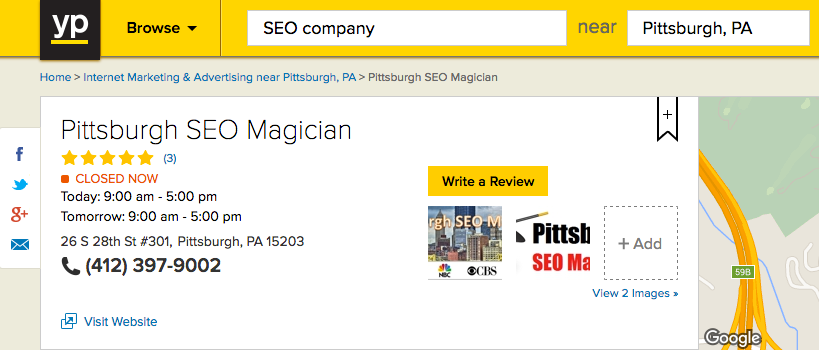Local businesses are often intimidated by search engine optimization (SEO) because it feels like a marketing activity that only large companies (with unlimited budgets and staff) dominate. However, it’s vital to find a local SEO marketing strategy for local businesses to capitalize on — if they do a few tasks consistently.
Here are some facts and data/reports proofing why local SEO is vital:
- 4 out of 5 consumers use search engines to find local information
- 50% of consumers searched for a local business on their smartphone visited the store within 24 hours (34% of those who searched on a computer/tablet did the same)
- 51% of consumers search for local businesses on-the-go
- 30% would prefer buy in-store (vs. online) if they knew a local store was nearby
Below I have included my “5 Tips For Your Local SEO Marketing Strategy” that you can use TODAY to dominate your local search rankings and move to the front page… Meaning more website traffic and more phone calls from new/potential customers for your business!
Tip #1: Set Up Your Google Business Listing
Right now, Google is the #1 search engine people use when looking for local services from the area they live in, both on their mobile phone/device and desktop computer. Before you can start optimizing your business listing for search, you need find out how your business presents itself on Google.
If you are not listed as a verified business in Google (Google My Business) you aren’t qualified as a local business. However, if you have a storefront or service a particular local area, you are classified as a local business.
But wait, there are a two more factors that come into play with your Google My Business listing.
Not only do you need to be local, but your business also needs to have a local identity. Local identity doesn’t mean that people need to be aware of your business, but that you are recognized as being in a specific location for your Google My Business listing. To have a local identity, you must have a physical location (not a P.O. Box) and a local phone number (not a 1-800 or in addition to a 1-800).
This is the first step every business owner MUST to take to dominate their local seo marketing strategy
#2 – Claim ALL Your Business Citation Listings
Tip #2 is an expansion of tip #1. After claiming your Google verification listing, you need to make sure you have your business citation listed on all the local directories. are spreading your business all over the web with stronger numbers. Your business citation is your NAP (name, address and phone number). Your business citation needs to listed on a plethora of local directories in order to help the search engines (and your customers) find you quickly and easily.
A good place to start is by checking your local listing score by doing a local listing scan with Yext.com. Some examples of local directories you can list your business citation on are Yellow Pages, Yelp, Super Pages, AngiesList.com.
Example – See My Yellow Pages Listing Below
#3 – Keep Your Listings Consistent
Every place you promote your business, should have the same consistent information. You’ll want to always share your NAP (name, address and phone number) with the same exact information and the same style (unless otherwise dictated). Any online space you have a presence on — from your own website and social profiles to directories and maps — should have the same information.
Being consistent will reinforce your brand image in the online world. Keep in mind that it is a two-against-one mentality: the more places your NAP is listed the same, the stronger your search results will be for all your local SEO marketing strategy
Lastly, make sure the products or services your business offers is consistent as well so you can rank for these target keywords in the search engines, as well as in the business directories when people search for your services on YellowPages.com (your city hair solon, your city personal injury lawyer, your city dental care, etc) and find your business listing because it’s optimized for those keywords.
#4 – Include Keywords On Social
Keywords are often the most confusing thing about SEO — even for seasoned SEO strategists. While being listed in many places makes sense from a numbers perspective, keywords are a bit more qualitative than quantitative.
A good rule of thumb about which keywords to choose (and use frequently across social sites and content, which we’ll get to next) are simply detailed descriptors of your business.
Let’s review an example, using a law firm that describes themselves as “law” or “legal services.” These keywords are too broad and apply to every single law firm in the U.S., so we want to dig deeper. “Chicago law firm,” or “Chicago legal services” would be better keywords for SEO because they define the local area the business is in, as well as descriptors. The law firm could go deeper still, by using a long-tail keyword (sentences), such as “Norwood Park bankruptcy legal services.”
Taking these descriptive keywords and including them in your social posts will help you to be found on social and add strength to your business’s search. Twitter is, once again, being indexed by Google in real-time helping your tweets spread further and quicker across the web.
#5 – Become The “Go-To” Expert With Content Marketing
Tips 1-3 will help you establish your SEO, but they can only take you so far. Using keywords on social media will boost your ranking on social, but if you aren’t regularly posting content, you’re using a butter knife when you really need a butcher knife.
Content marketing gets known for the key phrase “content is king”. The reason why creating content (blog articles, videos, etc) is so powerful is because it brings in an audience in a way advertisements and traditional marketing methods can’t, while also strengthening your business brand and authority online (becoming the “Go-To” expert in your niche/industry).
By regularly writing as a guest blogger, writing your own articles on your blog, or creating “how to” videos for your business, while incorporating keywords and topics your target audience needs, you will be providing value which in return will bring in more website traffic, more leads, and more sales for your business.
Using these 5 tips for your local SEO marketing strategy will get you on the right path to dominating the local search engine and bringing in a flood of new customers calling you or opening your door.
Nathan Argenta
Owner of Pittsburgh SEO Magician
P.S. If you received value from this article, please comment below with your feedback and share on social media!



